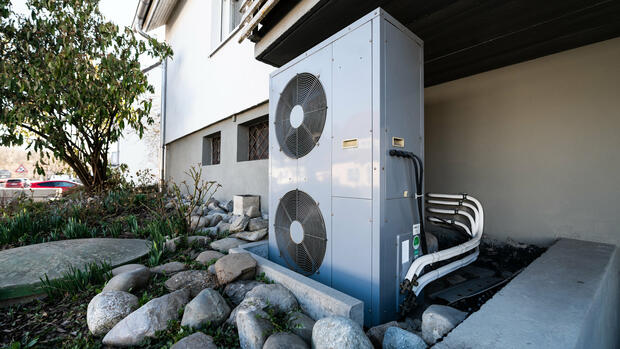The traffic light coalition had been arguing about the heating law for a long time.
(Photo: dpa)
Karlsruhe The Federal Constitutional Court stopped the planned passage of the controversial heating law in the Bundestag on Friday in an urgent procedure. The highest German court in Karlsruhe announced on Wednesday that the second and third readings should not be carried out in the current session week.
Representatives of the CDU and CSU were very satisfied and spoke of a slap in the face for the traffic light coalition of SPD, Greens and FDP. In the first reactions, FDP politicians blamed the Greens.
The CDU member of the Bundestag Thomas Heilmann had applied for a temporary order. This should prohibit the Bundestag from the final deliberation and vote on the law if the bill has not been submitted to the deputies in writing at least 14 days in advance. Heilmann wrote on Twitter: “This is a great success for our parliamentarism and in this specific case also for climate protection!”
Heilmann had argued that his rights as a member of parliament had been seriously violated by the legislative process. “The traffic light is ruining the heat transition with a last-minute legislative package and an unconstitutional procedure,” he accused the coalition. Due to the shortened deliberations on the amendment to the Building Energy Act (GEG) in Parliament, no conceptual weaknesses in the legislative package could be identified and changed.
The court now declared that Heilmann’s main application in the organ dispute proceedings does not appear to be inadmissible from the outset or obviously unfounded in view of his right to equal participation in parliamentary decision-making under Article 38 of the Basic Law.
“The deputies not only have the right to vote in the German Bundestag, but also the right to advise.” The assessment of the consequences leads to the result “that the reasons for issuing a temporary injunction outweigh the reasons”. The interest in avoiding an irreversible violation of participation rights outweighs the intervention in the procedural autonomy of the Bundestag, which merely delays legislation. The decision was made in the Second Senate by a vote of five to two.
The CDU member of the Bundestag had applied for a temporary injunction.
(Photo: IMAGO/Stefan Zeitz)
Union faction leader Friedrich Merz rated the stop as a “serious defeat for Olaf Scholz’s federal government”. “The federal government’s unspeakable dealings with parliament and the public have now been put a stop to,” said the CDU chairman of the German Press Agency. “Olaf Scholz and his federal government would be well advised to use the judgment from Karlsruhe to pause. Things cannot go on in the German Bundestag as they have been up to now.”
The head of the CSU deputies in the Bundestag, Alexander Dobrindt, said in Berlin: “The traffic light should now go into itself and this botched law should finally be stamped out.” CSU General Secretary Martin Huber spoke of a “resounding slap in the face for the federal government”. He demanded: “The heating law must be removed and completely rewritten.”
The FDP Vice-Chairman Wolfgang Kubicki rated the Karlsruhe urgent decision as a “deserved acknowledgment for the Greens, who put an inexplicable pressure on this process,” as he told the Funke media group. The FDP MP Frank Schäffler praised the decision. “Thoroughness comes before speed. It was wrong to fall for the Greens here,” he wrote on Twitter.
SPD parliamentary group leader Matthias Miersch reacted calmly. “The decision must of course be respected. It does not affect the content of the law,” he told the Rheinische Post. “The court expressly points out the possibility of a special session, which must now be discussed.”
Cabinet passes law after weeks of argument – and continues to argue
For weeks, the traffic light partners had been arguing about the heating law from Economics Minister Robert Habeck (Greens) and Building Minister Klara Geywitz (SPD). The FDP in particular had concerns – and sent Habeck’s Ministry of Economics a catalog with 77 questions to attract the public.
Finally, the cabinet passed the bill. But even before the first reading in the Bundestag, the traffic light agreed on further changes, which they set out in partly vaguely formulated “guard rails” – a very unusual procedure that led to an initial expert hearing on the original draft law, which was already outdated at the time.
Merz: “Heavy defeat for the federal government of Olaf Scholz”
The coalition factions have now submitted amendments to the original draft law to the Bundestag. The heating law was originally supposed to be passed in the Bundestag on Friday – before the parliamentary summer break, which begins after July 7th.
More: Less funding for many heat pumps – traffic light specifies plans for heating replacement
